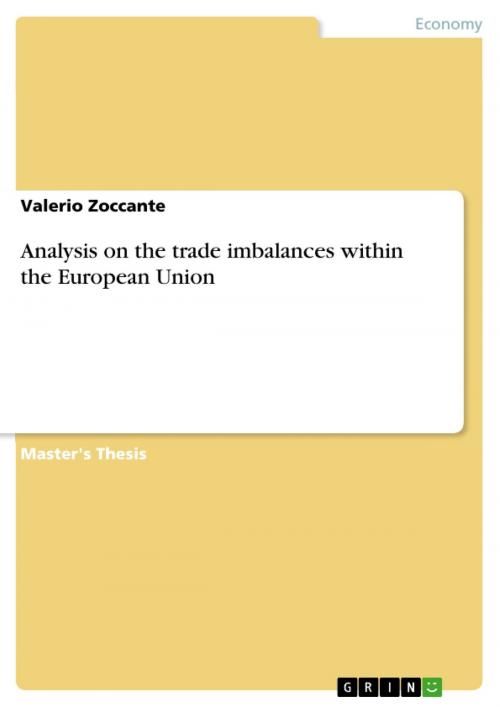Analysis on the trade imbalances within the European Union
Business & Finance, Economics, Macroeconomics| Author: | Valerio Zoccante | ISBN: | 9783668009325 |
| Publisher: | GRIN Verlag | Publication: | July 1, 2015 |
| Imprint: | GRIN Verlag | Language: | English |
| Author: | Valerio Zoccante |
| ISBN: | 9783668009325 |
| Publisher: | GRIN Verlag |
| Publication: | July 1, 2015 |
| Imprint: | GRIN Verlag |
| Language: | English |
Master's Thesis from the year 2015 in the subject Economics - Macro-economics, general, grade: B, University of Southern Denmark, language: English, abstract: The aim of this work is to assess the factors that have been affecting the imbalances of trade within countries of the European Union. The analysis takes into consideration the elements that could affect the balance of trade, thus saving or investment. The variables that are included in the panel data framework are related to productivity, inflation, consumption, wage level, capital movements, demography of the population, economic growth, public and private debt levels. A panel data, that leaves out countries from East Europe, is created, and takes values that go from 2002 to 2013. The panel data shows that technology gaps and capital movements have been the main factors that affected the balance of trade of the peripheral countries. Peripheral countries did not invest enough in projects that could enhance the productivity, leading to a competitiveness loss that was not followed by a correction of the wage levels. Moreover, capital movements have been financing consumption surges in Greece and Portugal, whereas in Spain and Ireland those capitals have fueled credit booms and house bubbles. Therefore, those countries have been experiencing a worsening of their balance of trade, and investors have not been willed anymore to finance additional debt. Indeed, Members of the euroarea could not guarantee that the central bank could play the role of lender of last resort. Knowing that, in a currency union, the external position of a country represents its capacity of producing goods and services that could serve the debt in a troubled time, in the eyes of the investors the balances of trade of the peripheral eurozone countries became relevant during the European sovereign debt crisis. In the European framework, in order to decrease the imbalances of trade within the Members, fiscal transfers to peripheral countries could be beneficial for decreasing the cost that peripheral countries need to undergo during the adjustment period, whereas reforms that aim to enhance productivity in the peripheral countries and increase the mobility and the flexibility of the product and labor markets could be highly helpful. The following work highlights all those elements in a empirical framework, relating, however, the results to the literature that has been developed around the European case and the optimum currency area.
Master's Thesis from the year 2015 in the subject Economics - Macro-economics, general, grade: B, University of Southern Denmark, language: English, abstract: The aim of this work is to assess the factors that have been affecting the imbalances of trade within countries of the European Union. The analysis takes into consideration the elements that could affect the balance of trade, thus saving or investment. The variables that are included in the panel data framework are related to productivity, inflation, consumption, wage level, capital movements, demography of the population, economic growth, public and private debt levels. A panel data, that leaves out countries from East Europe, is created, and takes values that go from 2002 to 2013. The panel data shows that technology gaps and capital movements have been the main factors that affected the balance of trade of the peripheral countries. Peripheral countries did not invest enough in projects that could enhance the productivity, leading to a competitiveness loss that was not followed by a correction of the wage levels. Moreover, capital movements have been financing consumption surges in Greece and Portugal, whereas in Spain and Ireland those capitals have fueled credit booms and house bubbles. Therefore, those countries have been experiencing a worsening of their balance of trade, and investors have not been willed anymore to finance additional debt. Indeed, Members of the euroarea could not guarantee that the central bank could play the role of lender of last resort. Knowing that, in a currency union, the external position of a country represents its capacity of producing goods and services that could serve the debt in a troubled time, in the eyes of the investors the balances of trade of the peripheral eurozone countries became relevant during the European sovereign debt crisis. In the European framework, in order to decrease the imbalances of trade within the Members, fiscal transfers to peripheral countries could be beneficial for decreasing the cost that peripheral countries need to undergo during the adjustment period, whereas reforms that aim to enhance productivity in the peripheral countries and increase the mobility and the flexibility of the product and labor markets could be highly helpful. The following work highlights all those elements in a empirical framework, relating, however, the results to the literature that has been developed around the European case and the optimum currency area.















